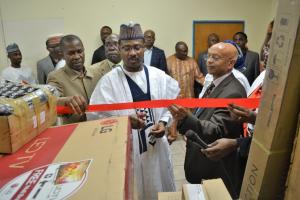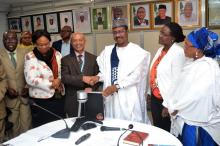WHO provides unprecedented support to Nigeria’s Coordination Center to close perennial routine immunization gaps
Abuja, 31 August 2017-The World Health Organization (WHO) has donated equipment to the National Emergency Routine Immunization Coordination Centre (NERICC) to improve responsiveness in the resolution of routine immunization (RI) gaps especially in low performing areas for immunization.
Receiving various equipment on 30 August 2017, Dr Faisal Shuaib, the Executive Director of the National Primary Health Care Development Agency (NPHCDA) said, “WHO is among the first partner agencies to indicate support for NERICC”. He added that with the donation, “WHO has demonstrated unprecedented support to NERICC by providing equipment and human resources to facilitate the operationalization of its overarching goal. ”
The NERICC was set-up on 17 June 2017 to strengthen coordination of routine immunization and ultimately increase coverage as part of a comprehensive plan by NPHCDA. NERICC aims to provide a national and sub-national coordination mechanism to manage the full implementation of RI strategies and guidelines towards achieving immunization coverage of greater than 85% for all vaccine preventable diseases at national, state and LGA levels by 2019.
In a brief hand-over ceremony held at NPHCDA, the WHO Country Representative (WR), Dr Wondimagegnehu Alemu observed that “the recent National Immunization Coverage Survey results were a shocking eye-opener for all of us and WHO, with support from donor agencies, is here today to show our commitment to rapidly reverse the trend”.
While acknowledging the sense of urgency, the motivation and commitment exhibited by the team at NERICC, WR emphasized that “increasing demand for immunization needs a rethinking and trial of different approaches towards achieving set targets”.
A major finding from the 2016 Multiple Indicators Cluster Survey/National Immunization Survey Coverage (MICS/NICS) was that seventy seven percent (77%) of children aged 12 – 23 months in Nigeria have not received all the routine vaccinations as recommended by the national EPI schedule, while forty percent (40%) of children in this age group did not receive any vaccinations which is far below the ninety percent (90%) national target that had been set by the country.
• Technical contact:
Dr Fiona Braka; Tel: +234 703 1705 252 ; Email: brakaf [at] who.int (brakaf[at]who[dot]int)




